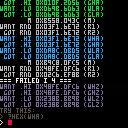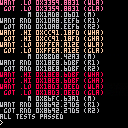
Here's a re-implementation of PICO-8's RNG in PICO-8. Of note, the last line of rng.rnd is just returning rng.hi%n but with some modulo arithmetic to account for within-PICO-8-overflow and be 1:1 with calling the built-in rnd.
function init_rng(seed)
local rng={}
function rng.srand(seed)
seed=seed or 0
rng.hi,rng.lo=
seed==0 and 0x6000.9755 or seed^^0xbead.29ba,
seed==0 and 0xdead.beef or seed
for i=1,0x20 do rng.rnd() end
end
function rng.rnd(n)
n=n or 1
rng.hi=(rng.hi<<0x10|rng.hi>>>0x10)+rng.lo
rng.lo+=rng.hi
return ((rng.hi<0 and 0x8000-n or 0)%n+(rng.hi&0x7fff.ffff)%n)%n
end
rng.srand(seed)
return rng
end |

While I'm not 100% certain, PICO-8 does not seem to be using Lua's in-built PRNG. Doing a test with Lua's math.random() function and PICO-8's rnd() function, both with the same seed, gives different results. I know that doesn't give you a complete answer, but at least eliminates one possibility. :)

thanks @Meep, very helpful!
a small correction: negative seeds don't behave properly; I messed with the code a bit and this seems to fix it:
seed=(seed or 0)&0x7fff.ffff
edit: hmm I made an automatic test case and found more discrepancies; there's some issue that occurs only sometimes when the m in prng.rnd(m) is negative. it doesn't break the prng's state, but something about the return rng.hi%n replacement isn't working. here's a test cart:
and here's a minimal repro: (even after adding in my &0x7ff...)
cls() s,m = -2319,0xdc19.beb0 srand(s) prng=init_rng(s) assert(rnd(m)==prng.rnd(m)) |

I figured it out! here's a repro with nicer numbers:
cls() s,m = 1,-1 srand(s) prng = init_rng(s) r1 = rnd(m) r2 = prng.rnd(m) ?tostr(r1,1) ?tostr(r2,1) assert(r1==r2) |
the issue boils down to trying to do hi%n while treating hi and n as u32s, but pico8 represents them as i32s. for example, hi%n has issues when n=0xffff -- as a u32, n is almost certainly higher than hi, so the result should be hi. but as an i32, n is -1, and so hi%n discards the integer part of hi, returning hi&0x0.ffff instead.
more details:
here's the fixed code:
local function _rnd(n) n=n or 1 hi<<>=0x10 hi+=lo lo+=hi -- return hi%n, but treat hi and n as if they were u32 instead of i32 if n<0 then return n<=hi and hi<0 and hi-n or hi end -- hi := hi8 + hi7 -- hi%n = (hi8%n + hi7%n)%n return ((hi<0 and 0x7fff%n+1 or 0) + (hi&0x7fff.ffff)%n) % n end |
and here it is in the test cart:

I fixed some more edge cases with seeding, e.g. srand("cat") and srand(0) (both behave the same as srand(nil))
Here's the full code:
function init_rng(seed)
local lo,hi
local function _rnd(n)
n=n or 1
hi<<>=16
hi+=lo
lo+=hi
-- return hi%n, but treat hi and n as if they were u32 instead of i32
if n<0 then
return n<=hi and hi<0 and hi-n or hi
end
-- hi := hi8 + hi7
-- hi%n = (hi8%n + hi7%n)%n
return ((hi<0 and 0x7fff%n+1 or 0) + (hi&0x7fff.ffff)%n) % n
end
local function _srand(seed)
seed = tonum(seed) or 0
if seed==0 then
hi,lo = 0x6000.9755,0xdead.beef
else
seed &= 0x7fff.ffff
hi,lo = seed^^0xbead.29ba,seed
end
for i=1,32 do
_rnd()
end
end
_srand(seed)
return {
rnd=_rnd,
srand=_srand,
get_state=function() return hi,lo end, --compare peek4(0x5f44,2)
set_state=function(nhi,nlo) hi,lo = nhi,nlo end,
}
end |
and if you'd rather a C implementation, see https://www.lexaloffle.com/bbs/?pid=81103#p (I guess the core algorithm hasn't changed since then! I assumed it had, but I guess just rnd(table) has changed)
[Please log in to post a comment]












